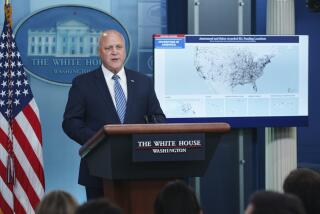Microsoft Pledges $58 Million to Get Mexicans Online
- Share via
MEXICO CITY — President Vicente Fox’s ambitious but vague “e-Mexico” plan to link 98% of this nation’s people to the Internet got a boost Thursday as Microsoft Corp. Chief Executive Steve Ballmer promised $58 million over five years to train thousands of teachers and software programmers.
E-Mexico is a $4-billion initiative to foster Internet use in education and health projects, partly by having large telecommunications carriers connect about 10,000 communities by 2006. Telephone companies here have expressed cautious support for the plan.
How Mexico will finance the purchase of the thousands of computers needed to complete the system is uncertain. The Fox government has suggested that the costs be covered by private investment and municipal coffers. Just teaching people how to use computers and access the Internet is another big challenge.
Appearing at a news conference here Thursday, Ballmer said Microsoft’s gift will address the second challenge: training about 3,000 teachers and 20,000 software programmers. But he emphasized that Mexico must do its share by completing the infrastructure.
So far, only 250 communities have been wired to the network.
“This has been the launch period, but we are expecting to increase tenfold the number of communities with Internet access” by next year, said Julio Cesar Margain, a chief project manager in the Ministry of Communications and Transportation.
Mexico’s initiative is one of several underway in Latin American nations, including Brazil, Colombia and Peru, to accelerate the use of computers and the Internet by inducing private companies to join with governments to supply the needed infrastructure, said Luis Anavitarte, vice president and research director for Gartner Dataquest, a research company in San Jose.
In addition to providing educational and health resources, the Internet could be used by poor, remote communities to find markets for their products. Recent pilot projects funded by multinational agencies have set a successful pattern.
Governments’ bottom lines also could benefit, said Gabriela Baez, an analyst with Pyramid Research in Boston.
“I think the adoption of the Internet for procurement and administrative tasks can help improve efficiency in different government entities, as well as help promote government initiatives,” she said.
But Mexico faces greater challenges than most major Latin American countries. Access to land-line telephones, personal computers and the Internet is relatively limited. Since early 1996, only 6.4 million personal computers have been sold in Mexico, according to Gartner Dataquest, a small number given the nation’s 100 million people.
However, Anavitarte said Mexico also enjoys at least one big advantage over other Latin American nations: It belongs to the North American Free Trade Agreement, which entitles it to lower-cost computer hardware and software.
Ballmer, while acknowledging the hurdles ahead, said he sees big opportunities for Microsoft.
“The Mexican computer market could double in the next several years,” he said.
Microsoft will partner with the government’s existing institutions to make its training available to more Mexicans, Ballmer said.
Admitting that many are skeptical of Fox’s e-Mexico effort, Margain said the Microsoft announcement “is giving us a great boost .”
*
Kraul is a staff writer. Aguirre is a special correspondent.






